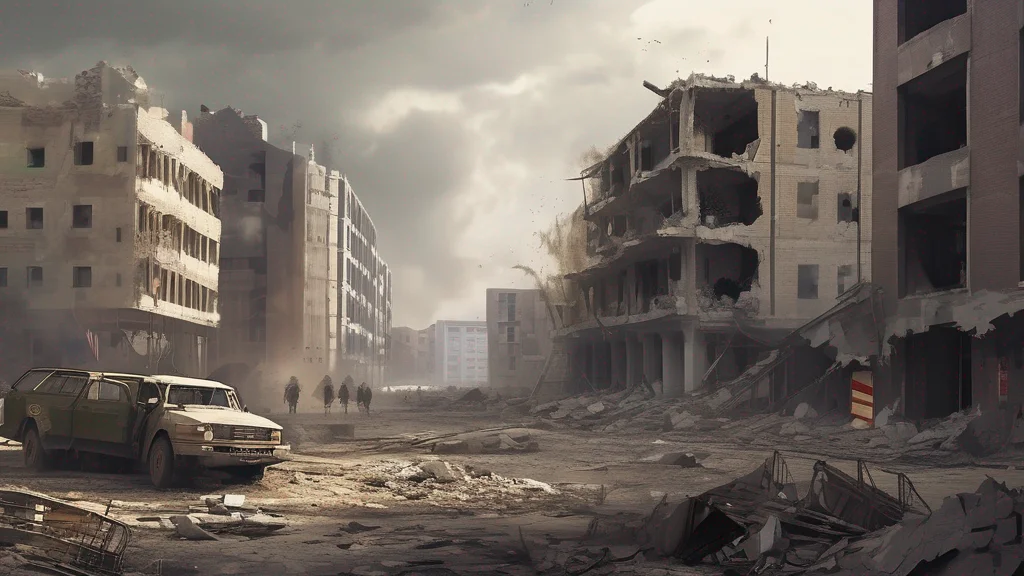The Complexities of War: Legal, Ethical, and Strategic Dimensions of the IDF's Campaign
Exploring the Legal, Ethical, and Strategic Dimensions of the IDF's Demolition Campaign

- Examine the IDF’s controversial demolition campaign.
- Understand the legal implications under the Fourth Geneva Convention.
- Explore ethical considerations of military actions in conflict zones.
- Analyze the strategic rationale behind the demolitions.
- Discuss the global implications and precedents set by such actions.
The Complexities of War: Legal, Ethical, and Strategic Dimensions of the IDF’s Campaign
In the intricate theater of modern warfare, the lines between military necessity and humanitarian obligation often blur, sparking intense debates among legal experts, ethicists, and strategists alike. The Israeli Defense Forces’ (IDF) recent demolition campaign offers a poignant case study of these tensions. As the IDF razes buildings in conflict zones, they argue it is a tactical necessity, while critics claim it contravenes international humanitarian law and ethical standards.
Legal Framework: The Fourth Geneva Convention
At the heart of the legal debate is the Fourth Geneva Convention, established in 1949 to protect civilians in times of war. According to Eitan Diamond, a senior legal expert at the Diakonia International Humanitarian Law Centre, the controlled destruction of civilian property during armed conflict is generally prohibited unless under narrow conditions of absolute military operational necessity. “Destruction of property because of concerns or speculations about its possible future use falls well outside this exception,” Diamond asserts.
The Geneva Conventions are a cornerstone of international humanitarian law, designed to limit the barbarity of war. Under these conventions, occupying powers have a duty to protect the civilian population and refrain from actions that cause unnecessary suffering or damage. This legal framework is central to assessing the legitimacy of the IDF’s demolition activities.
Ethical Considerations: The Moral Imperative
Beyond the legalities, the ethical dimensions of the IDF’s actions cannot be overlooked. Professor Janina Dill, co-director of the Oxford Institute for Ethics, Law & Armed Conflict, emphasizes that an occupying power must administer a region for the benefit of the population. “This is incompatible with a military approach that simply makes the territory uninhabitable and leaves nothing standing,” she argues.
Ethical analysis in war often grapples with the principle of proportionality, which seeks to balance military objectives with the minimization of harm to civilians. Critics contend that the widespread destruction of infrastructure not only undermines the immediate humanitarian needs of civilians but also jeopardizes long-term prospects for peace and stability.
Strategic Rationale: Security and Safety
In contrast, some analysts defend the IDF’s actions as a necessary response to the realities of combat in heavily contested areas. Prof. Eitan Shamir, director of the BESA Center For Strategic Studies in Israel, notes that many of the demolished buildings were already in ruins due to prior shelling and air strikes. These structures pose safety risks for returning civilians, particularly “during winter rains when they are more likely to collapse.”
From a tactical perspective, the IDF argues that the demolitions prevent adversaries from using abandoned buildings as fortifications or weapons caches. “The area is a combat zone,” Shamir explains. “Even when a building has been entered and cleared by the IDF, once the Israelis exit it, the terrorists often return to plant bombs or hide inside to shoot at them.”
Balancing Perspectives: A Multifaceted Debate
The debate over the IDF’s campaign highlights the challenges of balancing legal, ethical, and strategic considerations in warfare. On one hand, the legal and ethical imperatives emphasize the protection and welfare of civilian populations. On the other, military strategists argue for measures that safeguard their forces and achieve operational objectives.
This tension is not unique to the Israeli-Palestinian conflict; it is emblematic of broader dilemmas faced by military organizations worldwide. In asymmetric warfare, where combatants and civilians are often intermingled, the risks of collateral damage and civilian casualties are heightened.
Global Implications: Setting Precedents
The actions of the IDF and the subsequent global reactions set important precedents for how similar situations may be handled in the future. As conflicts continue to evolve, so too must the frameworks that govern them. The international community faces the ongoing challenge of updating legal and ethical standards to address the realities of modern warfare.
Conclusion: Navigating the Gray Areas
In conclusion, the IDF’s demolition campaign underscores the complex interplay between legal obligations, ethical considerations, and military strategy. As the world grapples with these issues, it is crucial for policymakers, military leaders, and international bodies to engage in open dialogue and seek solutions that uphold humanitarian principles while addressing security concerns.
The debate is far from settled, and the need for ongoing scrutiny and adaptation of international law remains paramount. As conflicts persist, so does the imperative to find a balance that respects human rights and addresses the legitimate security needs of states.
Call to Action: Engage in the Dialogue
Readers, what are your thoughts on this multifaceted issue? How can international law evolve to better address the challenges of modern warfare? Join the conversation and share your perspectives in the comments below.